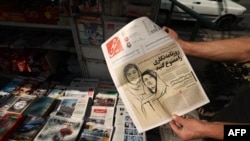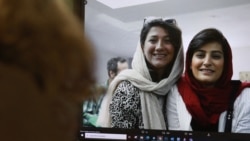WASHINGTON - A U.S. media rights group says Iran has kept two jailed female journalists in legal limbo for more than a month after their trials began as a ploy to make global attention fade as it figures out what to do with the women whose detentions sparked outrage in the West.
Elaheh Mohammadi and Niloufar Hamedi were taken to Tehran's Revolutionary Court on May 29 and 30 respectively for the first sessions of their closed-door trials. Since then, there has been no word from Iranian officials or relatives and lawyers of the two women on when or whether the reporters will have a second trial session at the court.
Iranian authorities jailed Hamedi and Mohammadi last September for their coverage of the death and funeral of Mahsa Amini, a 22-year-old Iranian Kurdish woman whom Tehran police arrested that month for allegedly not following Iran's strict Islamic dress code. Amini's death in police custody within days of her arrest triggered months of nationwide protests against Iran's ruling Islamist clerics.
Hamedi had photographed Amini's distraught parents embracing inside the Tehran hospital where Amini died after falling into a coma, while Mohammadi covered and wrote about Amini's funeral in the northwestern city of Saqqez. Both reporters were working for Iranian state approved news outlets.
Iranian intelligence agencies issued a joint statement in October accusing Hamedi and Mohammadi of being agents of the U.S. Central Intelligence Agency, or CIA. Iranian authorities later charged them with being collaborators of a "hostile" United States, acting against national security and spreading anti-government propaganda.
The U.S. State Department denounced what it called May’s "sham" trials as a "mockery of justice." In a June 1 tweet, U.S. Special Envoy for Iran Robert Malley wrote: "Journalism is not a crime. Iranian authorities should stop jailing journalists like Elaheh and Niloufar simply for doing their jobs."
Addressing the U.N. Human Rights Council on Wednesday, the chairperson of the Independent International Fact-Finding Mission on Iran, Sara Hossein, said the two women were among at least 17 journalists in the country "remaining in detention ... for their alleged reporting on the protests."
Yeganeh Rezaian, a senior researcher with the U.S.-based Committee to Protect Journalists, discussed the legal limbo of Hamedi and Mohammadi in this week's edition of VOA's Flashpoint Iran podcast.
The following transcript of Rezaian's June 28 interview has been edited for brevity and clarity.
VOA: What do you know about the status of Iran's legal proceedings against the two female journalists?
Yeganeh Rezaian, Committee to Protect Journalists: It seems as if the regime is trying to keep them in a limbo situation. One speculation, which has been reoccurring in that system, is that once a political prisoner becomes high profile, usually the regime likes to keep them in that limbo and extend their imprisonment, hoping that at some point, they will be forgotten in the world. And once their name is not out there anymore, the regime can, in a face-saving way, let them out, or give them a sham trial and sentence and quietly let them serve a bit of their sentence.
But the truth is that these two female journalists are innocent. They did not do anything wrong, except report the truth and inform not just their domestic society but also the international community. And they are paying the price for doing their job truthfully.
The world is not going to forget about them. The longer they stay in the dungeon, the more their names will be spread out.
VOA: How much awareness do Iranian officials have about the big network of international support that these two women have? Are you aware that messages from CPJ and other rights groups are getting through to Tehran?
Rezaian: Absolutely, because the regime has an expansive cyber army. And their first and foremost job is monitoring any news about the country that is out in the international arena. So they know exactly what awards these women have been nominated for and what organization is issuing statements in their support. I promise you, based on personal experience, and also on our work with previous cases, that the regime is monitoring how the world is reacting.
VOA: How has the international support for Mohammadi and Hamedi impacted their treatment by the Iranian government?
Rezaian: The support has already resulted in the fact that they dropped the charges of espionage, which could have been punishable by execution; the fact that they realize that they do not have any supporting documents for proving such a farce of a charge; and also the fact that they do not know how to deal with the cases.
One of the reasons that political cases often get extended is because the officials themselves are not sure about how to deal with them.
If [Hamedi and Mohammadi] were dual citizens, [the regime] would be looking to either ask for money or a prisoner swap [in return for their release]. But these women are just two local journalists working for state-run media. Technically, they went through all kinds of background checks within the system. So [the regime] cannot say they are spies. They are not.
VOA: How do you see the Iranian government treating its own state-approved journalists going forward?
Rezaian: The truth is that Iran's media scene has been terrible since the regime came to power. They have in many cases throughout the years treated the media, and domestic journalists in particular, very brutally and harshly. That is why so many journalists are emigrating and going to self-imposed exiles. They know that as long as they are inside the country, they will not be able to do their jobs freely and safely. Those who decide to stay know they will be silenced by arrest and long-term detention and harsh sentences.
Obviously, very silently and slowly killing traditional journalism is what the regime is looking for. They would love to see more and more people leave this profession, and to see those who think differently than the regime go silent and do other things. This is not a new phenomenon, but with all the ways that the regime is treating journalists, it has been sped up.






